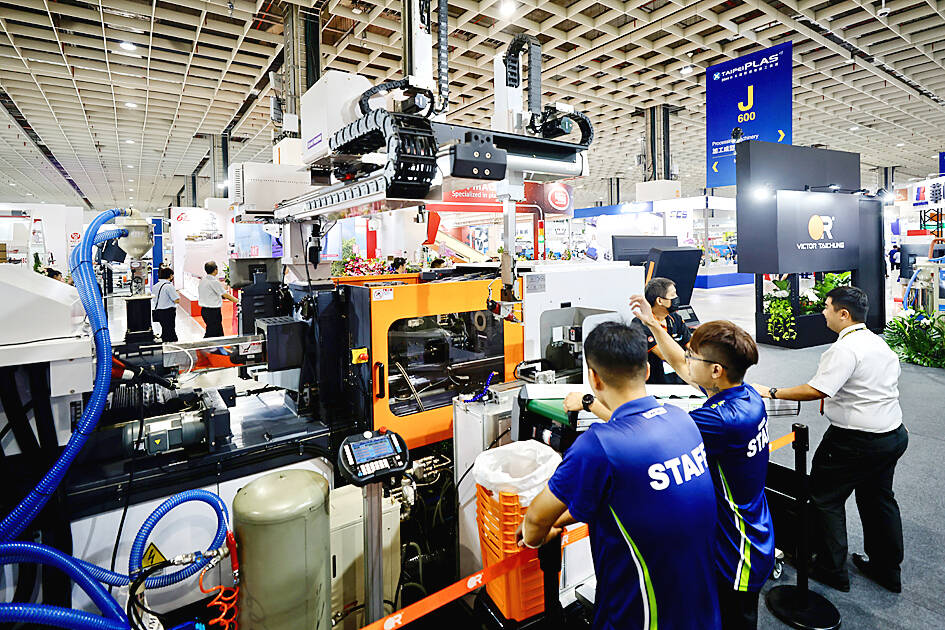Operating conditions for Taiwanese manufacturers fell last month amid lingering economic weakness in the US, Europe and China, the Chung-Hua Institution for Economic Research (CIER, 中華經濟研究院) said yesterday.
The official manufacturing purchasing managers’ index (PMI) shed 4.4 points to 49.2, dropping back into contraction territory, as companies turned from cautious to conservative regarding their business prospects, CIER president Lien Hsien-ming (連賢明) said.
“The subindices on new business orders, industrial production and business outlook all declined into the contraction zone, which could suggest a turning point,” Lien said.

Photo: Ritchie B. Tongo, EPA-EFE
PMI data aim to measure the health of the manufacturing industry. Values of 50 or higher indicating expansion, while values below the threshold suggest contraction.
The sentiment shift had to do with the market’s lack of enthusiasm over global sales of iPhone 16s and a stall in demand for electronics used in artificial intelligence (AI) applications, Lien said.
That explained why the critical subindex on new orders lost 8.2 points to 48.5, while the measure on industrial output tumbled 10.6 points to 46.8, the institute said in its monthly survey.
New export orders sank 8.2 points to 44.6, while unfinished orders dropped 5.9 points to 43.5, the survey showed.
PMI readings already pointed to a slowdown in the US, Europe and China, Lien said, adding that oil exporters last month trimmed their sales forecasts.
CIER researcher Chen Shin-hui (陳馨蕙) said that the absence of a growth catalyst accounted for the lackluster showings, despite the onset of the high season for technology products.
The reading on the six-month business outlook shrank 5.3 points to 47.5, putting an end to seven months of optimism, the survey showed.
CIER vice president Wang Jiann-chyuan (王健全) said that AI is in a bit of a bubble, which would be seen in last month’s shipments.
A Chinese ban on Nvidia Corp chips also would affect local firms in its supply chain, Lien said.
Taiwanese firms would need more time to judge whether rate cuts by the US Federal Reserve and stimulus measures in China would shore up the world’s two largest economies, he said.
Taiwan’s non-manufacturing sectors also experienced a slowdown, but remained at healthy levels, CIER said in a separate survey, as the non-manufacturing index lost 1.2 points to 53.3.
The PMI slowdown weighed on shipping rates and new credit controls by Taiwan’s central bank dampened buying interest at home, CIER said.
However, most service providers are positive about their business going forward, keeping the reading on the six-month outlook at 53.1, it said.

The US dollar was trading at NT$29.7 at 10am today on the Taipei Foreign Exchange, as the New Taiwan dollar gained NT$1.364 from the previous close last week. The NT dollar continued to rise today, after surging 3.07 percent on Friday. After opening at NT$30.91, the NT dollar gained more than NT$1 in just 15 minutes, briefly passing the NT$30 mark. Before the US Department of the Treasury's semi-annual currency report came out, expectations that the NT dollar would keep rising were already building. The NT dollar on Friday closed at NT$31.064, up by NT$0.953 — a 3.07 percent single-day gain. Today,

‘SHORT TERM’: The local currency would likely remain strong in the near term, driven by anticipated US trade pressure, capital inflows and expectations of a US Fed rate cut The US dollar is expected to fall below NT$30 in the near term, as traders anticipate increased pressure from Washington for Taiwan to allow the New Taiwan dollar to appreciate, Cathay United Bank (國泰世華銀行) chief economist Lin Chi-chao (林啟超) said. Following a sharp drop in the greenback against the NT dollar on Friday, Lin told the Central News Agency that the local currency is likely to remain strong in the short term, driven in part by market psychology surrounding anticipated US policy pressure. On Friday, the US dollar fell NT$0.953, or 3.07 percent, closing at NT$31.064 — its lowest level since Jan.

The New Taiwan dollar and Taiwanese stocks surged on signs that trade tensions between the world’s top two economies might start easing and as US tech earnings boosted the outlook of the nation’s semiconductor exports. The NT dollar strengthened as much as 3.8 percent versus the US dollar to 30.815, the biggest intraday gain since January 2011, closing at NT$31.064. The benchmark TAIEX jumped 2.73 percent to outperform the region’s equity gauges. Outlook for global trade improved after China said it is assessing possible trade talks with the US, providing a boost for the nation’s currency and shares. As the NT dollar

The Financial Supervisory Commission (FSC) yesterday met with some of the nation’s largest insurance companies as a skyrocketing New Taiwan dollar piles pressure on their hundreds of billions of dollars in US bond investments. The commission has asked some life insurance firms, among the biggest Asian holders of US debt, to discuss how the rapidly strengthening NT dollar has impacted their operations, people familiar with the matter said. The meeting took place as the NT dollar jumped as much as 5 percent yesterday, its biggest intraday gain in more than three decades. The local currency surged as exporters rushed to